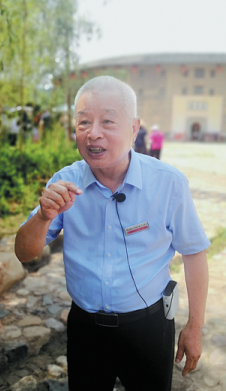Rural dwellings stand as proud legacies in Fujian
Ancestral homes of Hakka people fuel tourism influx






"I fully understand the deep feelings of my parents-in-law toward tulou. They are reluctant to leave an area where they have lived all their lives, even though we could afford to buy them a new house with better living conditions," Wang said.
"In view of this, my husband has come to take care of them and help them manage the tourism business, because in our Hakka culture, filial duty is very important.
"More important, we, as fourth-generation tulou owners, have the responsibility to protect and pass on the property to future generations."
The ancient complexes have left increasing numbers of young people, who have left tulou to live in modern buildings, proud of their hometown.
Huang Xiaona, who lives in Hukeng village and has worked as a tour guide since 2010, said that when she was a child, she lived with her grandparents in a tulou, which is still a beautiful memory.
When Huang grew up, she left the building with her parents to live in the town. She said that compared to new buildings, tulou have no modern conveniences and their rooms are small.
However, every time she takes her daughter to the tulou where she lived, Huang said she is highly excited, as the experience is totally different to life in a modern building.
"Although we have left the tulou, we are strongly aware of the need to protect the ancient buildings well, as they are legacies from our ancestors," Huang added.
- China unveils first AI model to gauge weather's impact on stock market
- Tianjin launches youth program to cultivate university talent for tech market
- Local farmers combat desertification in Moyu county of Xinjiang
- N China's Hohhot launches winter amusement programs to boost local economy
- Viral app bares 'safety anxiety' among solo dwellers
- Research suggests causes of moon's two different 'faces'

































